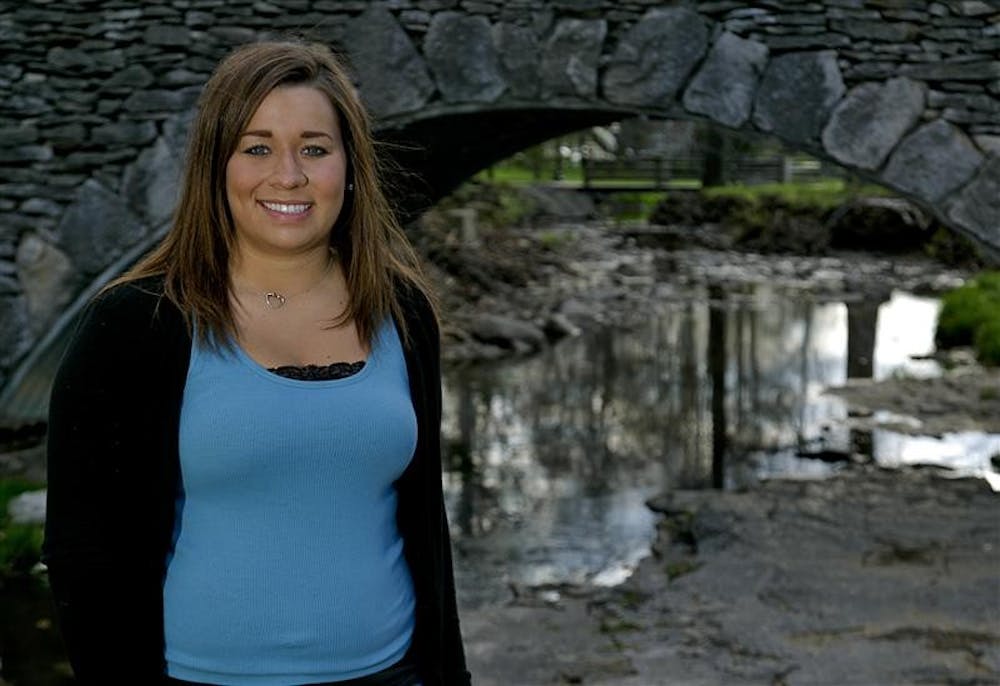Four days after graduating from high school, Sarah Mordis woke up and couldn’t move the left side of her body.
“I was sleeping over at a friend’s house after a graduation party, and when I woke up my left arm and left leg were dead weight,” Mordis said. “My friend heard me fall while trying to get out of bed, and we were like, ‘Something’s obviously wrong.’”
After being rushed to an area hospital where doctors could not diagnose her condition for seven hours, she was taken to the intensive care unit, where the then-18-year-old Mordis learned she suffered from a stroke and would have to relearn how to walk, talk and use her left arm.
Now a fully-rehabilitated IU senior, Mordis was one of two main speakers at the Bloomington Heart Ball, which took place Saturday at Assembly Hall.
The American Heart Association sponsored the black-tie event, which featured silent and live auctions, a gourmet dinner and speeches, said the association’s Communications Director Jeannine Templeman.
IU President Michael McRobbie also attended the event.
Templeman said she asked Mordis to speak at the event because Mordis is an IU student and a representative of the younger sufferers of cardiovascular disease.
“It’s important to show people that there are many different faces of cardiovascular disease,” Templeman said.
And sometimes the face of cardiovascular disease is, like Mordis, indistinguishable from anyone else her age.
Though Mordis said she sometimes has to check the left side of her face in photos to make sure it matches the right, she shows no signs of having survived a stroke four years ago.
Mordis doesn’t hesitate to share her story, which she said comes in part from the acceptance she got from her sorority sisters at Alpha Omicron Pi.
“I was apprehensive to talk about my stroke with my sisters freshman year,” Mordis said. “I was really self-conscious. But when I told them, the girls were amazing with all
of their help and love.”
Templeman also said Mordis’ stroke was a classic example of why people need to be more aware of the signs of strokes and heart attacks, because, if health professionals had diagnosed Mordis’ stroke earlier, the rehabilitation might not have been so
intense.
But even though Mordis’ stroke could have been diagnosed earlier, she said she was never worried or scared, even when she had no idea what had happened.
“While I was in the ICU, I looked over and my dad was bawling,” Mordis said. “I told him, ‘If I’m not crying, you’re not crying.’ I was never scared. I just thought that I needed to get better. So I did.”
Doctors discovered that an undetected heart defect had led to Mordis’ stroke and, after treating that, sent Mordis to rehabilitate her weakened body. She kept herself motivated by focusing on one goal: coming to IU.
“I had plans to come to IU in the fall,” Mordis said. “The whole time I was like, ‘I need to go to IU and move on with my life.’”
Mordis spent 16 days in a rehabilitation center and, for the rest of her summer, went to physical and occupational therapy three times a week. By the time move-in came, she was “just healthy enough” to start her college career.
“When I walked on my own for the first time, I was so excited,” Mordis said. “I called my best friend and she came down to watch me walk. It was incredible. It felt so weird, but when I was doing it, it was euphoria.”
In the two years after that, Mordis was able to walk across campus to her classes, participate in recruitment and stand for 36 hours at IU Dance Marathon.
Though she sometimes notices a residual weakness in her left side while running, she said she is now “perfectly healthy” and has the same chance as anyone else her age of having another stroke.
“The whole time, I thought of it as just a bump in the road,” Mordis said. “Why should I have sat there saying, ‘why me?’”
Now a senior, stroke victim looks ahead

Get stories like this in your inbox
Subscribe





